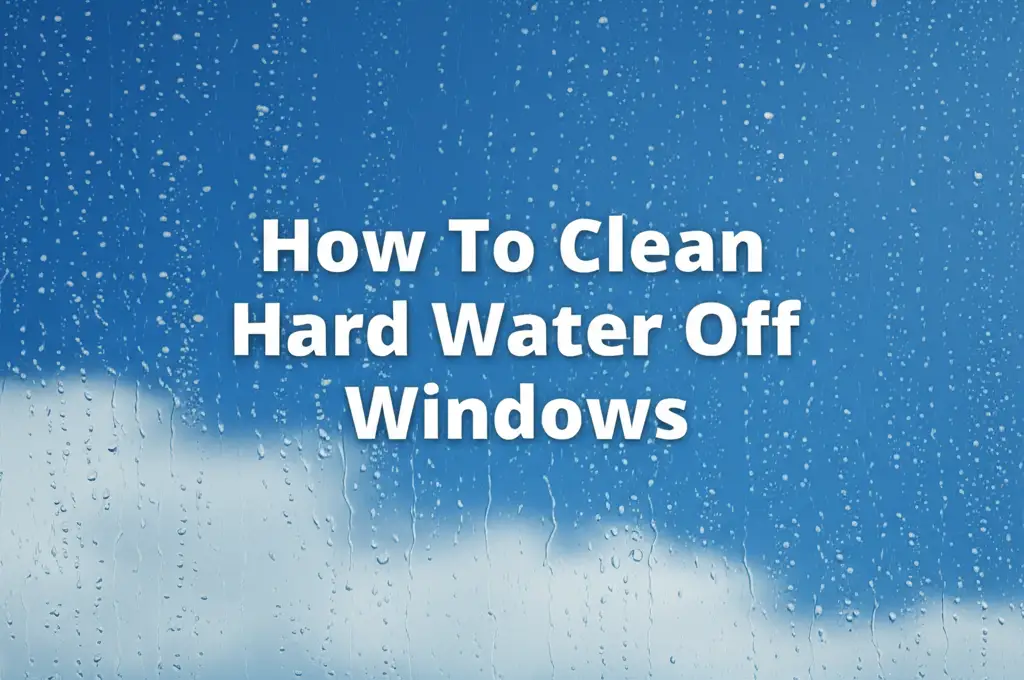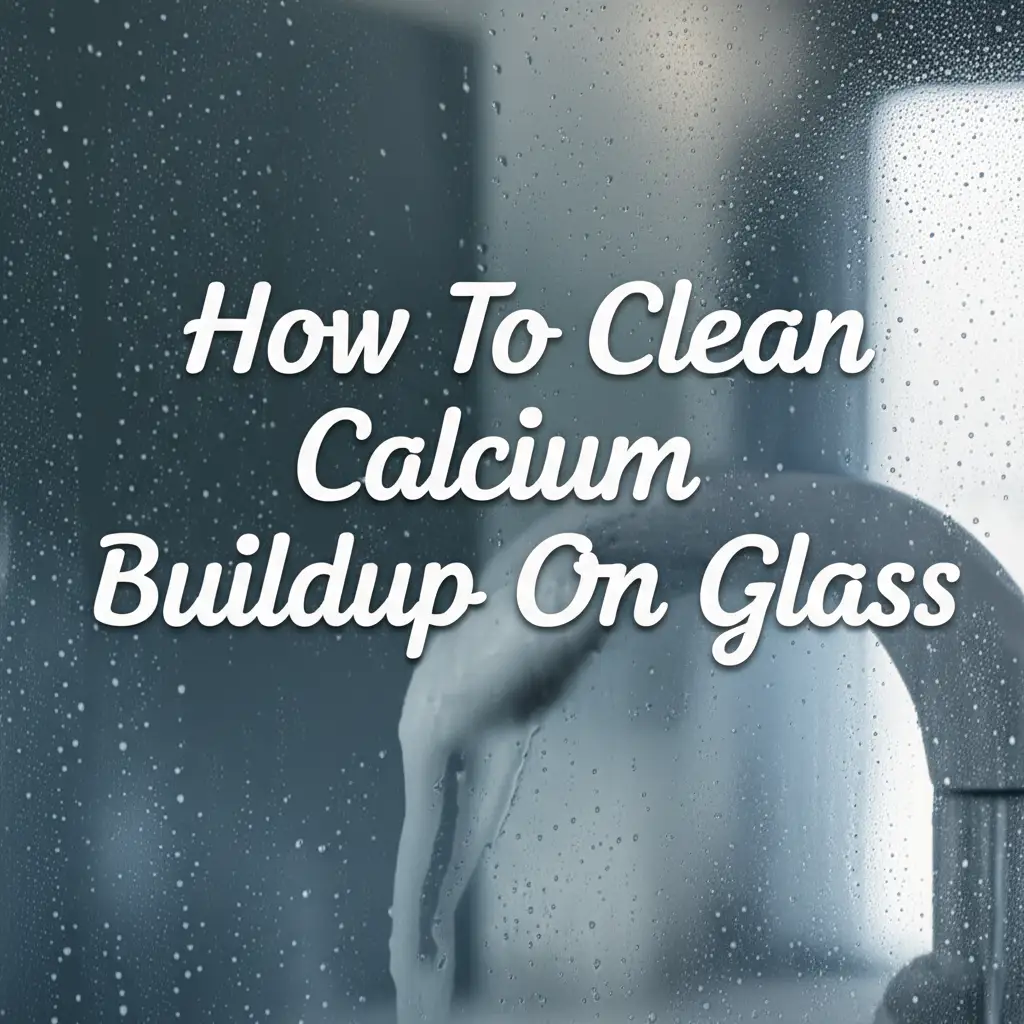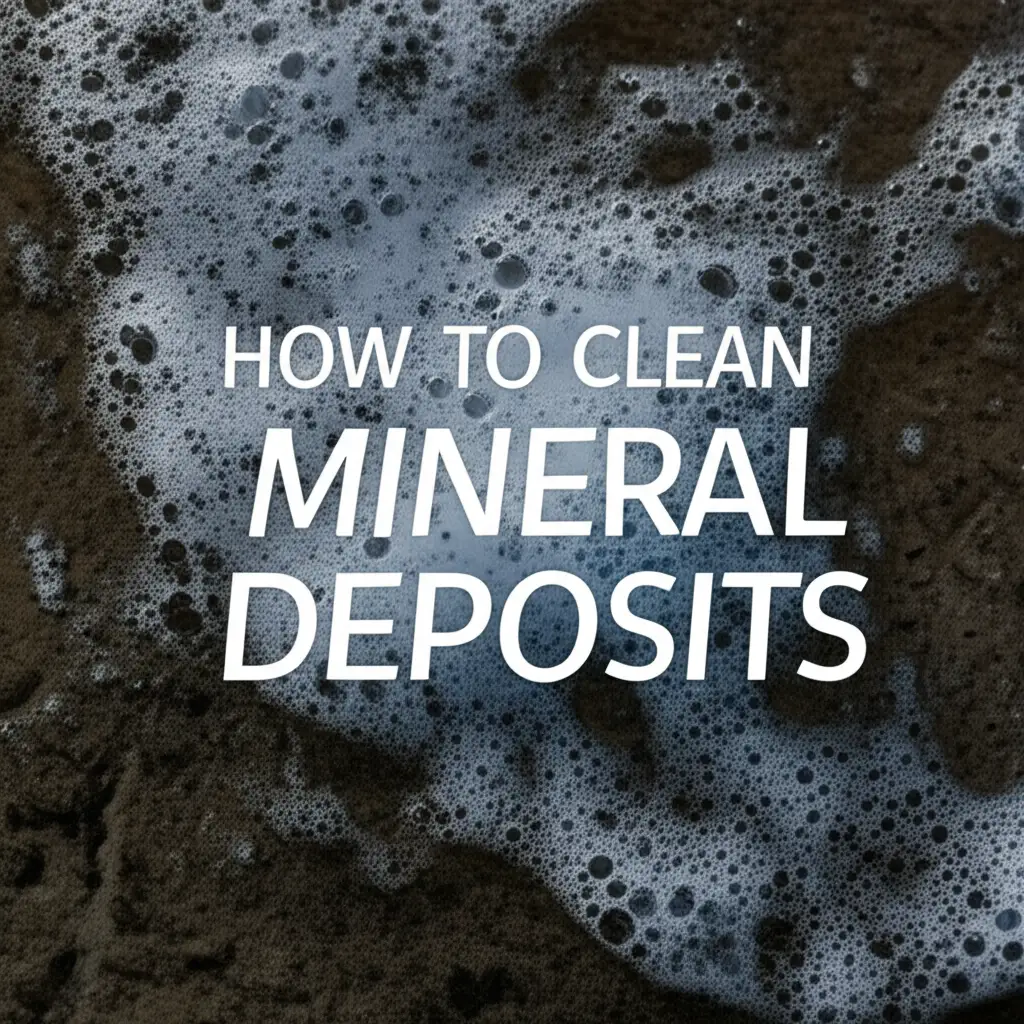· Home Cleaning · 11 min read
How To Clean Hard Water Off Windows

Sparkling Windows: How To Clean Hard Water Off Windows
Hard water stains on windows make your view cloudy. These mineral deposits can seem impossible to remove. I know the frustration of looking through spotty glass. This guide helps you get rid of those stubborn marks. We will explore effective methods, both natural and commercial, to restore crystal-clear windows.
Takeaway: Restore Your Windows
- Assess Stain Severity: Determine if stains are light or heavy.
- Choose Your Cleaner: Use vinegar for light stains, stronger acids for tough ones.
- Apply and Agitate: Let cleaner sit, then scrub with a non-abrasive tool.
- Rinse Thoroughly: Flush away all residue completely.
- Dry Streak-Free: Use a squeegee or microfiber cloth for best results.
- Prevent Future Stains: Wipe windows regularly and consider water softeners.
Cleaning hard water off windows involves using acidic solutions like white vinegar or specialized mineral removers. Apply the cleaner, allow it to break down deposits, then scrub gently with a non-abrasive pad. Rinse thoroughly with clean water and dry immediately for a streak-free finish.
Understanding Hard Water Stains on Windows
Hard water contains dissolved minerals like calcium and magnesium. When water evaporates on your windows, these minerals remain behind. They leave behind white, chalky residue. This residue builds up over time. It makes your windows look dull and dirty.
Several factors cause hard water stains. Sprinklers hitting your windows contribute to them. Rainwater mixed with hard water runoff also leaves marks. Even washing your windows with hard tap water can create new stains. The sun bakes these minerals onto the glass. This makes them harder to remove. Understanding the cause helps you prevent future issues.
Identifying the severity of your hard water stains is important. Light stains might appear as a faint haze. They are usually easy to remove with mild solutions. Heavy stains look like thick, white crusts. These require more aggressive cleaning methods. You can often feel the roughness of heavy deposits on the glass. Knowing what you are dealing with helps choose the right cleaning approach.
Gathering Your Window Cleaning Arsenal
Before you start cleaning, gather your supplies. Having everything ready makes the job easier. You will need a few basic items. These items help you clean hard water off windows effectively. I always make sure I have all my tools at hand.
For cleaning solutions, you have options. White vinegar is a popular choice for light to medium stains. Lemon juice also works as a natural acid. For tougher stains, you might need specialized hard water removers. These products contain stronger acids designed to dissolve mineral buildup. Always read product labels before using.
You will also need proper scrubbing and drying tools. A clean spray bottle helps apply solutions evenly. Microfiber cloths are excellent for wiping and buffing. A non-abrasive scrubbing pad or fine steel wool (specifically 0000 grade) can tackle stubborn spots without scratching glass. A good squeegee with a fresh rubber blade ensures a streak-free finish. Buckets for mixing solutions and rinsing are also useful. Always wear rubber gloves to protect your hands from chemicals.
DIY Solutions for Removing Hard Water Stains
Many household items work wonders on hard water stains. These natural solutions are often effective and gentle. They provide a cost-effective way to clean your windows. I find myself reaching for these methods first.
White vinegar is a cleaning superstar. It is acidic, which helps dissolve mineral deposits. Mix equal parts white vinegar and distilled water in a spray bottle. Spray the solution generously onto the stained window surface. Let it sit for 5-10 minutes to break down the minerals. For really tough spots, you can let it sit longer, or even apply full-strength vinegar. You can learn more about how vinegar cleans different surfaces, including how to clean hard water from shower heads. how to clean hard water from shower head
Lemon juice is another natural acid that can help. Its acidity is similar to vinegar. You can use it straight or diluted with water. Apply it the same way you would vinegar. Allow it to soak into the stains before scrubbing. It leaves a fresh scent too.
Baking soda creates a powerful paste. Mix baking soda with a little water or vinegar to form a thick paste. Apply this paste directly onto stubborn hard water spots. Let it sit for several minutes. The mild abrasive nature of baking soda combined with the acid helps lift the stains. For more tips on combining these two powerhouses, check out how to clean with vinegar and baking soda. how to clean with vinegar and baking soda
Specialized Cleaners for Stubborn Stains
Sometimes, DIY solutions are not enough. Very old or severe hard water stains need stronger help. Specialized commercial cleaners can remove these tough deposits. These products contain stronger acids or chelating agents. Always use caution and follow instructions.
Commercial hard water removers are formulated to dissolve minerals quickly. Look for products specifically designed for glass. Many brands offer dedicated hard water stain removers. These products often contain ingredients like phosphoric acid or hydrochloric acid. Such acids are much stronger than vinegar. They break down calcium and magnesium deposits efficiently.
When using commercial cleaners, wear protective gear. Gloves and eye protection are very important. Ensure good ventilation in the area. Apply the cleaner directly to the stains according to the product’s instructions. Some may require a specific dwell time. Others might need light scrubbing. Always test the product on a small, inconspicuous area first. This ensures it does not damage your window frames or glass coatings. Rinse the window thoroughly after use. Using these products correctly prevents damage and ensures safety. They are particularly useful for tackling challenging mineral buildup. You can also find specific guidance on cleaning hard water from other glass surfaces like how to clean hard water stains on shower glass. how to clean hard water stains on shower glass
Step-by-Step Window Cleaning Process
Cleaning hard water off windows requires a systematic approach. Following steps ensures effectiveness and a streak-free finish. This process helps you achieve clear windows every time. I follow these steps for the best results.
First, prepare the window. Use a soft brush or a dry microfiber cloth to remove loose dirt and dust. This step prevents scratching the glass during the cleaning process. It also helps the cleaning solution work better on the actual mineral deposits. Do not skip this initial dry wipe.
Next, apply your chosen cleaning solution. If using vinegar or lemon juice, spray generously. If using a commercial cleaner, apply as directed. Allow the solution to soak into the hard water stains for 5-15 minutes. This dwell time allows the acid to break down the mineral bonds. For very heavy stains, you might need to reapply or extend the soaking time. Patience is key at this stage.
After soaking, gently scrub the stained areas. Use a non-abrasive sponge, a dedicated glass scrubbing pad, or 0000 fine steel wool. Apply light to moderate pressure. Work in small sections, focusing on the mineral deposits. Avoid harsh scouring pads as they can scratch glass surfaces. Scrub until you see the stains beginning to lift.
Finally, rinse and dry the window. Use clean, distilled water or a hose to thoroughly rinse off all cleaning solution and dissolved minerals. Do not let the water dry on the glass, as it can leave new streaks. Immediately dry the window with a clean squeegee or a lint-free microfiber cloth. Work from top to bottom with your squeegee, overlapping each stroke. For cloth drying, use a clean, dry section for each wipe. This ensures a perfectly clear, streak-free window.
Tackling Stubborn and Baked-On Stains
Sometimes, hard water stains are deeply embedded. These baked-on deposits require more aggressive treatment. Do not give up if initial methods fail. There are still ways to achieve clear windows. I have faced these tough stains myself.
For extremely stubborn stains, a razor blade scraper can be effective. Use a new, sharp razor blade held at a very shallow angle to the glass (about 10-15 degrees). Keep the blade flat against the glass surface. Carefully scrape off the mineral buildup. This method requires great care to avoid scratching the glass. Always keep the glass wet while scraping. This reduces friction and makes the process safer. This method is best for small, concentrated areas of heavy buildup.
Another option is a polishing compound designed for glass. These compounds contain fine abrasives that can gently buff away mineral deposits. Apply the compound with a clean cloth. Rub in circular motions. Then buff clean with another cloth. This method helps restore shine and remove light hazing left by stubborn stains. Always choose a compound specifically for glass to avoid damage. Test in an inconspicuous area first.
Consider using a steam cleaner. Steam can help soften mineral deposits. After steaming, immediately scrub with a non-abrasive pad. The heat and moisture help loosen the bond of the minerals to the glass. Follow up with your chosen cleaning solution and rinse. Remember, for the toughest stains, a combination of methods might be necessary. Start with the least abrasive option and move up if needed. Persistence will pay off with sparkling clean windows.
Preventing Future Hard Water Buildup
Once your windows are clean, you want to keep them that way. Prevention is always easier than removal. Taking a few simple steps can significantly reduce future hard water stains. I prioritize these steps to maintain my clean windows.
Regular wiping is your best defense. After rain or if sprinklers hit your windows, wipe them down. Use a clean squeegee or a microfiber cloth. This removes water before minerals can dry and deposit. Keep a dedicated window squeegee and cloth handy for quick clean-ups. This simple habit saves you a lot of effort in the long run.
Adjusting sprinklers prevents window contact. Reposition sprinkler heads so they do not spray directly onto your windows. This eliminates a common source of hard water spots. If this is not possible, consider installing splash guards. Divert the water flow away from the glass. This small change makes a big difference.
Using a water softener for your home is a long-term solution. A water softener removes minerals from your entire water supply. This means all water used in your home is “soft.” It prevents hard water stains on all surfaces, not just windows. This includes shower glass, faucets, and dishes. While a larger investment, it offers comprehensive protection.
Finally, consider applying a water repellent coating to your windows. These coatings create a slick surface. Water beads up and rolls off easily. This reduces the chance for minerals to adhere to the glass. Reapply these coatings as directed by the manufacturer. These proactive measures help keep your windows clear and spotless.
Frequently Asked Questions
How can I tell if my window stains are hard water or something else?
Hard water stains look like white, hazy, or chalky spots. They often feel rough to the touch. Other stains like dirt or grime usually wash away easily with plain water and soap. Hard water stains cling to the glass even after a good rain. You can try a vinegar test. If vinegar fizzes or starts to dissolve the spots, it is hard water.
Is it safe to use a razor blade on windows for hard water stains?
Yes, it is safe if you use it correctly. Use a new, sharp razor blade. Keep the blade at a very low angle (10-15 degrees) to the glass. Ensure the glass surface is wet. Scrape gently and carefully. This technique removes stubborn, baked-on mineral deposits without scratching. Avoid using it on dry glass.
Can hard water permanently etch my windows?
Yes, hard water can permanently etch glass over time. The minerals, especially silica in the water, can bond chemically with the glass. This creates microscopic pitting. This etching makes the glass look cloudy even after cleaning. Regular cleaning prevents this irreversible damage. Act quickly when you notice hard water spots.
What is the best way to prevent hard water stains on new windows?
The best prevention methods involve immediate action. Wipe down windows quickly after they get wet from rain or sprinklers. Consider applying a rain-repellent or glass-protectant coating. These products create a slick surface. Water beads up and runs off easily, reducing mineral adhesion. Adjusting sprinklers to avoid window contact also helps immensely.
How often should I clean my windows to avoid hard water buildup?
Clean your windows at least every few months. If you live in an area with very hard water or frequent sprinkler contact, clean them more often. Weekly wiping of wet areas is ideal. This frequent cleaning prevents mineral buildup. It makes larger cleanings much easier. Consistent care keeps windows clear.
Conclusion
Cleaning hard water off windows can seem like a big job. With the right tools and techniques, it becomes manageable. You can restore clarity to your windows. We explored effective DIY methods using vinegar and lemon juice. We also looked at stronger commercial cleaners for stubborn spots. Remember the importance of thorough rinsing and proper drying for a streak-free shine.
Preventing future stains saves you time and effort. Regular wiping, adjusting sprinklers, and considering water softeners are key. Your windows are an important part of your home’s appearance. Keeping them clean enhances your view and natural light. Take action today to enjoy crystal-clear windows. Let your home truly shine.
- window cleaning
- hard water stains
- mineral deposits
- glass care
- DIY cleaning




